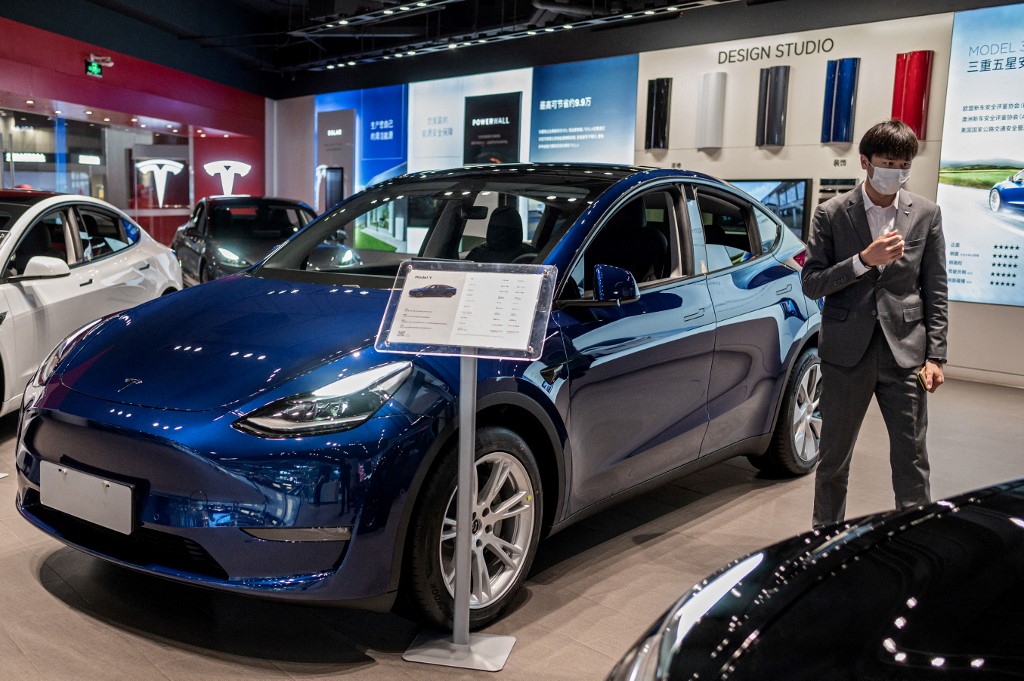(ATF) Tesla has suspended the use of bitcoin to purchase its vehicles, Elon Musk said on Wednesday, citing concerns about the use of fossil fuel for bitcoin mining.
The world’s biggest digital currency fell 17% – from around $54,819 to $45,700 – in the two hours after Musk wrote the announcement on Twitter at 2200 GMT.
But it later rebounded to about $50,000 during trading hours in Asia.
Also on ATF: Toyota profits jump 10% despite chip shortage and pandemic
While bitcoin enthusiasts savaged the Tesla founder for sparking the fall, others praised him for his environmental concerns and hoped he would accept alternative cryptocurrencies.
“If only there was a merge mined cryptocurrency that had a much smaller carbon footprint than bitcoin, and also had a dog on it,” said Twitter user “Shibetoshi Nakamoto”.
Musk has been recently touting dogecoin, another cryptocurrency built around the meme of a shiba inu dog, although he agreed with a co-host on Saturday Night Live who suggested that it was a “hustle”.
The Tesla “techno-king” said the company would not sell any bitcoin, and intends to use it for transactions as soon as mining transitions to more sustainable energy. “We are also looking at other cryptocurrencies that use <1% of bitcoin’s energy/transaction,” Musk said.
In March, Tesla announced that customers could buy its electric vehicles (EVs) with bitcoin.
ENERGY-INTENSIVE
The digital currency is created when high-powered computers compete against other machines to solve complex mathematical puzzles, an energy-intensive process that often relies on electricity generated with fossil fuels, particularly coal.
At current rates, such bitcoin “mining” devours about the same amount of energy annually as the Netherlands did in 2019, the latest available data from the University of Cambridge and the International Energy Agency show.
“Cryptocurrency is a good idea on many levels and we believe it has a promising future but this cannot come at great cost to the environment,” Musk said.
Tesla shares have been on a rollercoaster, surging after Electrek reported that second quarter production capacity is sold out.
But the news hasn’t been all positive. Carmaker Stellantis said it was likely to reach European carbon dioxide emission targets and would not need to buy credits from Tesla, originally estimated at 200 million euros this year.
Tesla also faces increasing competition with Volkswagen’s new, well reviewed EVs.
‘DOWNWARD SLOPING’
“Tesla’s stock has been in a downward sloping trading range over the past month,” Edward Moya, a strategist at foreign exchange Brokerage Oanda, said.
And to add to Musk’s concerns, Tesla lost its top-selling spot in China’s EV market this week too.
Tesla’s sales in mainland China dropped by more than 27% in April from March as it lost the top spot to SAIC-GM-Wuling Automobile as the world’s leading electric vehicle (EV) maker was embroiled in a product quality spat in the market.
But while China sales declined, Tesla achieved a record in exports of EVs made at its Shanghai factory.
The US-based electric carmaker sold 25,845 EVs in April, down 27.15% from March’s 35,478 vehicles, according to data released by the China Passenger Car Association (CPCA) on Tuesday. The April sales figure was still higher than the sales of 15,484 units in January and 18,318 in February.
SALES DECREASE
Tesla’s month-on-month sales decrease in April was steeper than the overall EV sales decrease in China, which was 12%, according to CPCA data.
The joint venture between SAIC Motor, General Motors, and Liuzhou Wuling sold 30,602 units of the popular budget EV model – Wuling Hongguang Mini EV – in April, regaining its No1 spot after losing temporarily to Tesla in March.
Guangdong-based BYD, which is backed by US billionaire Warren Buffett, came close behind Tesla in April. The passenger car association said BYD sold 25,450 new energy vehicles in April, up 6.5% from 23,906 in March.
Meanwhile, a report from Reuters said Tesla, due to uncertainty created by tensions between the US and China, has put on hold plans to buy land to expand its flagship plant in Shanghai into a global export hub.
EV TARIFFS
With 25% tariffs on imported Chinese electric vehicles imposed on top of existing levies under former President Donald Trump still in place, Tesla now intends to limit the proportion of Chinese output in its global production, according to the report.
Following reports on sales declines and the halt of its Shanghai plans, Tesla’s stocks fell another 1.88% on Tuesday May 11 – after a bruising dip of 6.4% on Monday. The shares, however, have jumped by roughly 288% over the past 12 months.
China is becoming a more and more important market for Tesla. The company made $3 billion in sales in the country during the first quarter, accounting for 29% of global sales for the period. That’s up from up from 21% for all of 2020.
In total, Tesla sold 95,125 cars in China over the first four months this year, CPCA data showed.
- With reporting by Reuters
























